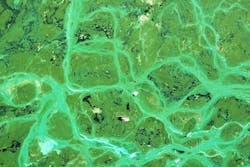Blue-Green Algae Toxins Found in West Palm Beach, Florida, Drinking Water
Cylindrospermopsin, a toxin produced by cyanobacteria (also known as blue-green algae), was detected in the drinking water from the city of West Palm Beach’s Water Treatment Plant.
This plant serves customers in West Palm Beach, the town of Palm Beach and town of South Palm Beach, according to West Palm Beach News and Weather.
West Palm Beach is in the process of removing cylindrospermopsin from its drinking water supply after alerting its 120,000 customers May 28, 2021, that it was found in levels above U.S. EPA guidelines. According to the Palm Beach Post, the city activated emergency wells, added powder-activated carbon and increased chlorine-free levels in the treatment process to mitigate the issue.
According to the Palm Beach Post, West Palm Beach first learned of cylindrospermopsin at low levels from a May 3 test. A May 17 test showed harmful levels for vulnerable populations and the city waited for confirmation tests received May 27 before alerting the Florida Department of Health.
According to the director of West Palm Beach Public Utilities Poonam Kalkat, no surface water treatment plant in the state has recorded high levels of this contaminant before, reported West Palm Beach News and Weather.
"This is uncharted territory for not just the city, but also for the state," Kalkat said, reported West Palm Beach News and Weather. “The EPA guideline for this unregulated contaminant is 0.7 ppb and the highest results we’ve seen over the last few days is 1.5 ppb and at that level, it is the vulnerable population that needs to take care."
National Oceanic and Atmospheric Administration monitoring images showed nearly two-thirds of the lake, or 500 square miles, were covered with blue-green algae, reported Tampa Bay Times.
It is unclear when the Florida DEP will remove the advisory or what the standards for the removal are, according to the mayor, reported West Palm Beach News and Weather.
Residents in vulnerable populations are urged not to drink tap water and boiling tap water will not destroy the cylindrospermopsin toxins, according to the Florida DOH.
As a result, conservation groups sent a letter urging Florida officials to set water quality standards for the harmful toxins in algal blooms, reported the Center for Biological Diversity.
West Palm Beach officials provided an update about the situation in a press conference June 3, which can be viewed online here.
